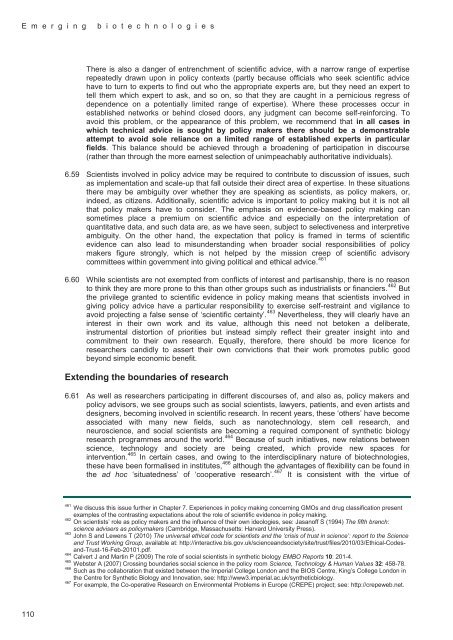Emerging biotechnologies: full report - Nuffield Council on Bioethics
Emerging biotechnologies: full report - Nuffield Council on Bioethics
Emerging biotechnologies: full report - Nuffield Council on Bioethics
You also want an ePaper? Increase the reach of your titles
YUMPU automatically turns print PDFs into web optimized ePapers that Google loves.
E m e r g i n g b i o t e c h n o l o g i e s<br />
There is also a danger of entrenchment of scientific advice, with a narrow range of expertise<br />
repeatedly drawn up<strong>on</strong> in policy c<strong>on</strong>texts (partly because officials who seek scientific advice<br />
have to turn to experts to find out who the appropriate experts are, but they need an expert to<br />
tell them which expert to ask, and so <strong>on</strong>, so that they are caught in a pernicious regress of<br />
dependence <strong>on</strong> a potentially limited range of expertise). Where these processes occur in<br />
established networks or behind closed doors, any judgment can become self-reinforcing. To<br />
avoid this problem, or the appearance of this problem, we recommend that in all cases in<br />
which technical advice is sought by policy makers there should be a dem<strong>on</strong>strable<br />
attempt to avoid sole reliance <strong>on</strong> a limited range of established experts in particular<br />
fields. This balance should be achieved through a broadening of participati<strong>on</strong> in discourse<br />
(rather than through the more earnest selecti<strong>on</strong> of unimpeachably authoritative individuals).<br />
6.59 Scientists involved in policy advice may be required to c<strong>on</strong>tribute to discussi<strong>on</strong> of issues, such<br />
as implementati<strong>on</strong> and scale-up that fall outside their direct area of expertise. In these situati<strong>on</strong>s<br />
there may be ambiguity over whether they are speaking as scientists, as policy makers, or,<br />
indeed, as citizens. Additi<strong>on</strong>ally, scientific advice is important to policy making but it is not all<br />
that policy makers have to c<strong>on</strong>sider. The emphasis <strong>on</strong> evidence-based policy making can<br />
sometimes place a premium <strong>on</strong> scientific advice and especially <strong>on</strong> the interpretati<strong>on</strong> of<br />
quantitative data, and such data are, as we have seen, subject to selectiveness and interpretive<br />
ambiguity. On the other hand, the expectati<strong>on</strong> that policy is framed in terms of scientific<br />
evidence can also lead to misunderstanding when broader social resp<strong>on</strong>sibilities of policy<br />
makers figure str<strong>on</strong>gly, which is not helped by the missi<strong>on</strong> creep of scientific advisory<br />
committees within government into giving political and ethical advice. 461<br />
6.60 While scientists are not exempted from c<strong>on</strong>flicts of interest and partisanship, there is no reas<strong>on</strong><br />
to think they are more pr<strong>on</strong>e to this than other groups such as industrialists or financiers. 462 But<br />
the privilege granted to scientific evidence in policy making means that scientists involved in<br />
giving policy advice have a particular resp<strong>on</strong>sibility to exercise self-restraint and vigilance to<br />
avoid projecting a false sense of ‘scientific certainty’. 463 Nevertheless, they will clearly have an<br />
interest in their own work and its value, although this need not betoken a deliberate,<br />
instrumental distorti<strong>on</strong> of priorities but instead simply reflect their greater insight into and<br />
commitment to their own research. Equally, therefore, there should be more licence for<br />
researchers candidly to assert their own c<strong>on</strong>victi<strong>on</strong>s that their work promotes public good<br />
bey<strong>on</strong>d simple ec<strong>on</strong>omic benefit.<br />
Extending the boundaries of research<br />
6.61 As well as researchers participating in different discourses of, and also as, policy makers and<br />
policy advisors, we see groups such as social scientists, lawyers, patients, and even artists and<br />
designers, becoming involved in scientific research. In recent years, these ‘others’ have become<br />
associated with many new fields, such as nanotechnology, stem cell research, and<br />
neuroscience, and social scientists are becoming a required comp<strong>on</strong>ent of synthetic biology<br />
research programmes around the world. 464 Because of such initiatives, new relati<strong>on</strong>s between<br />
science, technology and society are being created, which provide new spaces for<br />
interventi<strong>on</strong>. 465 In certain cases, and owing to the interdisciplinary nature of <str<strong>on</strong>g>biotechnologies</str<strong>on</strong>g>,<br />
these have been formalised in institutes, 466 although the advantages of flexibility can be found in<br />
the ad hoc ‘situatedness’ of ‘cooperative research’. 467 It is c<strong>on</strong>sistent with the virtue of<br />
461 We discuss this issue further in Chapter 7. Experiences in policy making c<strong>on</strong>cerning GMOs and drug classificati<strong>on</strong> present<br />
examples of the c<strong>on</strong>trasting expectati<strong>on</strong>s about the role of scientific evidence in policy making.<br />
462 On scientists’ role as policy makers and the influence of their own ideologies, see: Jasanoff S (1994) The fifth branch:<br />
science advisers as policymakers (Cambridge, Massachusetts: Harvard University Press).<br />
463 John S and Lewens T (2010) The universal ethical code for scientists and the ‘crisis of trust in science’: <str<strong>on</strong>g>report</str<strong>on</strong>g> to the Science<br />
and Trust Working Group, available at: http://interactive.bis.gov.uk/scienceandsociety/site/trust/files/2010/03/Ethical-Codesand-Trust-16-Feb-20101.pdf.<br />
464 Calvert J and Martin P (2009) The role of social scientists in synthetic biology EMBO Reports 10: 201-4.<br />
465 Webster A (2007) Crossing boundaries social science in the policy room Science, Technology & Human Values 32: 458-78.<br />
466 Such as the collaborati<strong>on</strong> that existed between the Imperial College L<strong>on</strong>d<strong>on</strong> and the BIOS Centre, King’s College L<strong>on</strong>d<strong>on</strong> in<br />
the Centre for Synthetic Biology and Innovati<strong>on</strong>, see: http://www3.imperial.ac.uk/syntheticbiology.<br />
467 For example, the Co-operative Research <strong>on</strong> Envir<strong>on</strong>mental Problems in Europe (CREPE) project; see: http://crepeweb.net.<br />
110
















